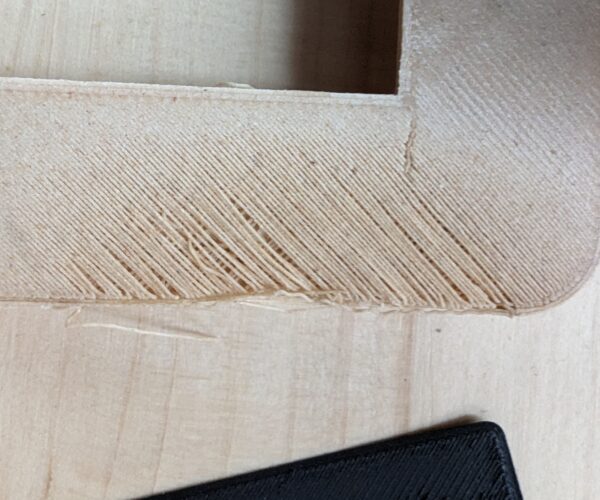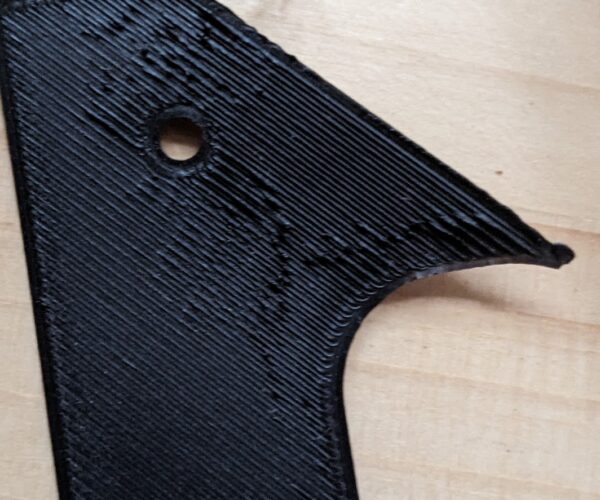First Layer issues
Not sure if this is due to user error or the 5.0.0 alpha firmware, but i hat 2 failed first layers on my MK4 in the last 2 days.+
Just cleaning the bed an re-start the print fixed the issue for me.... but without the alpha firmeware i never had this issues:
issue 1: one corner was waaaay of (not close enough!)
next time, one corner was to close:
not sure if this is due to the firmware or user error (maybe i somehow disturbed the mesh leveling?!?!) but i wanted to report anyway.
Will update to latest alpha firmware now (after current print is done)
RE: First Layer issues
just to be sure, I guess I printed 50 to 100 things on the prusa mk4, those 2 first layer errors have been my first issue but I was a bit disappointed cause now I need to watch the 1st layer again! I thought those days are over!
RE: First Layer issues
For what is worth, the first thing the printer says when you turn it on and have 5.0 installed is “this is an alpha fw, don’t leave the printer unattended” 😂
joking apart, I didn’t have that issue yet on 5.0, but if you’re looking for reliability, definitely don’t use an alpha firmware. Alpha means highly unstable and not ready for daily use, no matter how well it might work.
RE: First Layer issues
I know that I used alpha firmware and what that means, just wanted to report this cause I did not had this issue with the stable firmware before I went alpha! I case it is firmware / alpha related as I mentioned above.
RE: First Layer issues
Well, couple of things:
1) what material are you printing with?
2) are you using input shaper profile on prusa slicer (if you’re using that?)
asking that because it can be related if you’re printing PETG.
with default input shaper profile PETG prints WAY too fast and tend to underextrude, even tho that might be unrelated with the first layer.
What I’d do is trying to go back to stable (4.6.4) and check, with the same print, if the problem persists.
to do that load the 4.6.4 .bff on your usb, reboot and when you see the prusa logo double click the knob (the instructions tells you to keep presses, but they’re wrong).
RE: First Layer issues
I was using is on those prints and it was polymaker black pla and a wood pla from 3d Jake.
Only happens on 5.0.0 sofar and after a restart, the next print was perfect (looks like I or something disrupted the bed measures).
RE: First Layer issues
I have it currently also with FW 4.7.x and 5.0.0. Support said that the load cell sensor can be influenced by the filament if this is under tension from the roll. So before probing "pulled" some filament - this helped. In fact, I had it only with full rolls. Whether coincidence or solution - the next 100 prints will show...
RE: First Layer issues
I also find especially with PETG, 170 is not hot enough to fully liquify the petg, and when it oozes out a little before initial z probing the offset is too high, if you pull it off before hand it helps a bit
RE: First Layer issues
Cleaning the slight ooze and pulling the newer roll loose a little bit seemed to work
I also find especially with PETG, 170 is not hot enough to fully liquify the petg, and when it oozes out a little before initial z probing the offset is too high, if you pull it off before hand it helps a bit
RE: First Layer issues
In my opinion is far away from "alway perfect first layer" .. I have the issue on multiple printer (factory assembled) with FW 5.0 a4 and 4.7 latest. I print on them ASA and I can easily see that there are hight variations for the first layer from perfect to loose adhesion for the exact same print. I printed the last weeks hundrets of parts and I have some printer with much more issues than other.
What can influence the result:
- tension of filament spool .. I try to fix this with an PTFE tube and bearings on my spool holder
- dirty nozzle .. clean it very perfect before printing .. not good for serial production like with the MK3S+
- ... something more what I do not know right now ... why ist this effect much more visible on 2 of my six MK4 .. no idea so far
RE: First Layer issues
Looks like it is not related to the alpha firmware but is more influenced by other conditions like a clean nozzle,...
@SMaker3D I would report the issue to support and work with them if you not already did that. With 2 printers having the issue more often than others it might be easier to get to the root.
My assumption is that the sensor can get spoked by various issues, to much tension on the filament, dirty nozzle or filament paths,...
Maybe it would be at least possible to warn if the bed mash is very different from the previous one...
I did not had the issue anymore sofar but also did not print hundreds of parts.
RE: First Layer issues
This is realy important "Maybe it would be at least possible to warn if the bed mash is very different from the previous one" because this isn´t normal. Okay after nozzle change. And yes I´ve other issues too (or differences between the printers) and be in contact with the support already. But they do not offer support for alpha firmware, what I understand, but hopefully they report it internally to the dev team.
Here you can see two of the "perfect first layers" from my printer https://www.instagram.com/reel/CvKiRvjKoKz/?utm_source=ig_web_copy_link&igshid=MzRlODBiNWFlZA==
The only positive thing is .. to clean the nozzle is a lot easier with the new MK4 and I see the hardware has many potential for getting better over the time. The continous nozzle tension measurement should in the future avoid blobs like this one in my video and they will hopfully find a solution for the load cell sensor to measure the right height.
RE: First Layer issues
I have noticed that with Alpha 4 that the Z offset setting in Printer Settings appears to be being ignored. On firmware 4.7.1 the setting does make a difference on first layer ( my Z first layer calibration appears to be about -0.1mm off ) but then using Alpha 4, it does not appear to matter what value I put in for Z offset.
RE: First Layer issues
I had the same thing except, the problem was for me, the max speed for the pla I was using according to the manufacturer data was 60. So 110 over didn’t help much. Got some geeetech high speed pla and well, what a freaking difference.
Trying PETG now but with a 100mms profile I made based on manufactures data.
RE: First Layer issues
This is interesting .. why do they not have this adjustment .. hopefully because of a dream of an "always perfect first layer" and hopefully they have an better approach. For my new six MK4 there are four with better results than the other two. For one of them an adjustment would solve the "gap".
Later comments notwithstanding, the OP's pictures showed classic fingerprint shaped patches of poor adhesion. Keep the print sheet clean.
Cheerio,
RE: First Layer issues
I'm not a huge fan of the nozzle cleaning/load sensor to get "perfect first layers". I definitely don't get enough perfect first layers to consider the MK4 a "fire and forger" printer, unlike the MK3 where after setting the z-offset, it was "fire and forget" for months.
I think there are enough variances in the load sensor output (i.e. just tolerance issues), and dirty nozzles and not properly done nozzle cleaning that it is impossible to have a "fire and forget" "perfect first layer".
A more robust solution would have been to use the load sensor only when the user says to run a bed level calibration (i.e. after a nozzle, sheet change), and then have a PINDA type sensor like the MK3 for every print operation.
As it is, the load sensor is not reliable enough for "fire and forget".
This is interesting .. why do they not have this adjustment .. hopefully because of a dream of an "always perfect first layer" and hopefully they have an better approach. For my new six MK4 there are four with better results than the other two. For one of them an adjustment would solve the "gap".
RE: First Layer issues
Keep the knob pressed when it moves from the bottom left corner to the print area, before it starts the first layer (or even after it started). You can adjust live z
RE: First Layer issues
The whole point of the MK4 is to not deal with Live Z. The issue was filament on the nozzle during measurement
